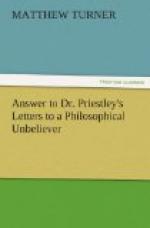Title: Answer to Dr. Priestley’s Letters to a Philosophical Unbeliever
Author: Matthew Turner
Release Date: November 22, 2004 [EBook #14120]
Language: English
Character set encoding: ASCII
*** Start of this project gutenberg EBOOK answer to Dr. Priestley ***
Attributed to Matthew Turner (d. 1788?) and William Hammon.
Transcribed by the Freethought Archives
Note: Irregularities in orthography and punctuation have been reproduced without emendation from the first edition of 1782.
ANSWER TO DR. PRIESTLEY’S LETTERS TO A PHILOSOPHICAL UNBELIEVER.
PART I.
LONDON. MDCCLXXXII
ADVERTISEMENT.
The Editor of this publication has more in object to answer Dr. Priestley than to deliver his own sentiments upon Natural Religion, which however he has no inclination to disguise: but he does not mean to be answerable for them farther, than as by reason and nature he is at present instructed. The question here handled is not so much, whether a Deity and his attributed excellences exist, as whether there is any Natural or Moral proof of his existence and of those attributes. Revealed knowledge is not descanted upon; therefore Christians at least need take no offence. Doubts upon Natural Religion have not hitherto been looked upon as attacks upon Revelation, but rather as corroborations of it. What the Editor believes as a Christian (if he is one is therefore another affair, nor does he reckon himself so infallible or incapable of alteration in his sentiments, as not at another time to adopt different ones upon more reflexion and better information; therefore, though he has at present little or no doubt of what he asserts (taken upon the principles laid down) he shall hold himself totally freed from any necessity of defending the contents of this publication if brought into controversy; and as he has no desire of making converts, hopes he shall not himself be marked out as an object of persecution.
Speculative points have always been esteemed fair matters for a free discussion. The religion established in this country is not the religion of Nature, but the religion of Moses and Jesus, with whom the writer has nothing to do. He trusts therefore he shall not be received as a malevolent disturber of such common opinions as are esteemed to keep in order a set of low wretches so inclinable to be lawless. At least, if he attempts to substitute better foundations for morality, malevolence can be no just charge. Truth is his aim; and no professors of religion will allow their system to be false. Or if he should be thought too bold a speculator, such of the ecclesiastics




